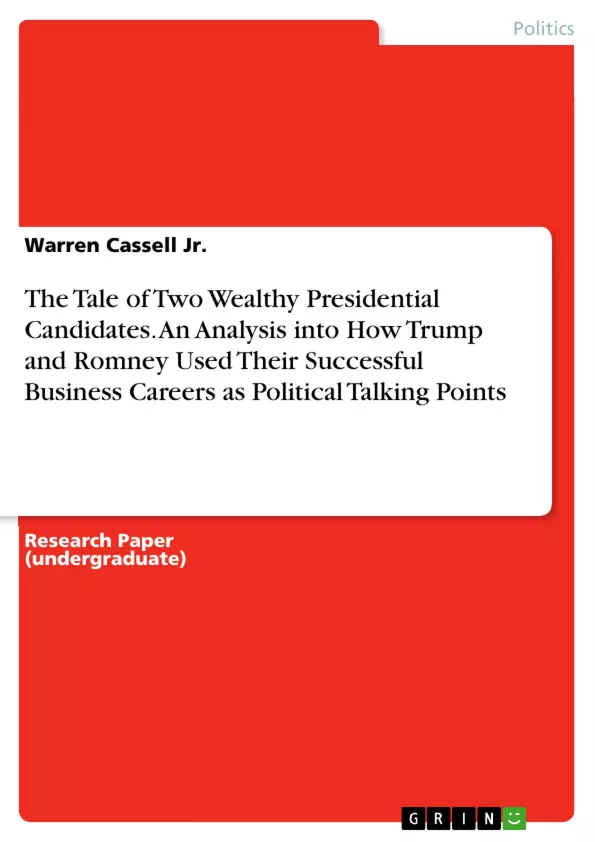The purpose of this research paper is to determine how the Trump and Romney presidential campaigns incorporated the business successes of their respective candidates in their political messaging. It also seeks to identify in what ways, if any, were the two campaigns similar and different in leveraging their candidates’ entrepreneurial skills. This study primarily draws upon the announcement speeches made by both candidates, as well as multiple speeches that were made at their respective nominating conventions. Prior research conducted in the field of narrative psychology analysis was used as a guide in order to better examine the above mentioned exhibits. The findings revealed that Trump leveraged his entrepreneurial accomplishments a lot more than Romney. The campaign strategies that Trump and Romney implemented might have been partially influenced by their personal narratives. The discoveries in this study can possibly be used in future research that focuses on understanding how the American electorate responds to the narratives of political candidates.
Inhaltsverzeichnis (Table of Contents)
- Introduction
- Methods
- Findings
- Discussion
- Conclusion
- References
Zielsetzung und Themenschwerpunkte (Objectives and Key Themes)
The objective of this research paper is to examine how the Trump and Romney presidential campaigns utilized the business achievements of their respective candidates in their political messaging. This study investigates similarities and differences in how the two campaigns leveraged their candidates' entrepreneurial skills.
- Narrative psychology as a framework for analyzing political campaigns
- The impact of personal narratives on campaign strategies
- How candidates use their business experience as a political talking point
- The influence of wealth and entrepreneurial success on political perception
- Comparative analysis of the Trump and Romney campaigns
Zusammenfassung der Kapitel (Chapter Summaries)
- Introduction: This chapter sets the stage for the research by highlighting the unusual nature of the 2016 presidential election cycle, particularly Trump's unconventional candidacy and the unique challenge of lacking a traditional political track record. It contrasts Trump's approach with Romney's previous campaign, focusing on the use of business experience as a political tool. The chapter introduces the concept of narrative psychology and its role in shaping personal and political identities.
- Methods: This chapter outlines the research methodology employed in the study. It explains the use of narrative psychological analysis to assess the political events staged by both the Trump and Romney campaigns. The specific exhibits chosen for analysis are detailed, including the candidates' announcement speeches and party nomination speeches, as well as speeches by family members and business associates of Donald Trump.
Schlüsselwörter (Keywords)
The primary keywords and focus topics of this research paper include narrative psychology, political campaigns, GOP, presidential elections, business experience, wealth, entrepreneurial success, and campaign messaging. The study delves into the complex relationship between personal narratives, political strategies, and the American electorate's perception of presidential candidates.
Frequently Asked Questions
How did Donald Trump and Mitt Romney use their business careers differently in their campaigns?
The study reveals that Donald Trump leveraged his entrepreneurial accomplishments as a central political talking point much more extensively than Mitt Romney did during his presidential run.
What role does "narrative psychology" play in political campaign analysis?
Narrative psychology serves as a framework to examine how candidates construct personal stories of success to influence public perception and connect with the electorate's values.
What specific speeches were analyzed in this research?
The research primarily draws upon the candidates' announcement speeches and multiple speeches made at their respective nominating conventions by themselves and their associates.
Why was the 2016 election cycle considered unusual for Trump?
Trump had an unconventional candidacy due to his lack of a traditional political track record, forcing him to rely almost entirely on his business narrative as proof of competence.
What are the findings regarding the impact of personal narratives on strategy?
The findings suggest that campaign strategies were partially influenced by the candidates' unique personal narratives, shaping how they addressed economic issues and leadership skills.
- Arbeit zitieren
- Warren Cassell Jr. (Autor:in), 2017, The Tale of Two Wealthy Presidential Candidates. An Analysis into How Trump and Romney Used Their Successful Business Careers as Political Talking Points, München, GRIN Verlag, https://www.grin.com/document/371662



